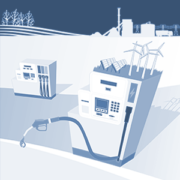Power to the people?
What role is there for electrofuel technologies in European transport’s low carbon future?
Liquid fuels are set to be part of the European and global transport energy supply for some time to come – and given limitations on sustainable biofuel production, the option of converting renewable electricity into petrol, diesel and jet fuel is a subject of renewed interest. This review, commissioned by the Brussels NGO Transport and Environment, considers the status and economics of electrofuel production, and the implications of a growth in electrofuel supply in the EU for electricity demand. It finds that the cost of electrofuel production, and in the particular the cost of input electricity, is a major barrier to competitiveness that looks likely to be difficult to overcome in the near future. Given the relative inefficiency of use of electricity for liquid fuel production as compared to direct supply of electricity to electric vehicles, electrofuel production should be considered as a niche solution primarily relevant in parts of transport where electrification and efficiency improvements cannot on their own deliver outcomes consistent with 2050 decarbonisation targets, notably aviation. The report also highlights the regulatory challenges of counting electricity as ‘renewable’ when used for electrofuel production, and highlights that the proposed regulatory framework under RED II could unintentionally undermine European environmental goals by double counting renewability.




